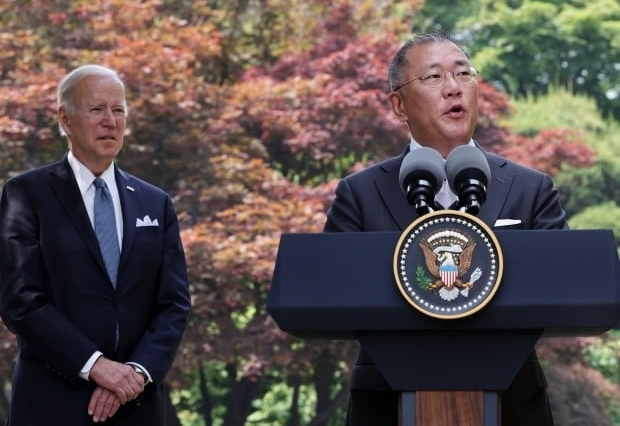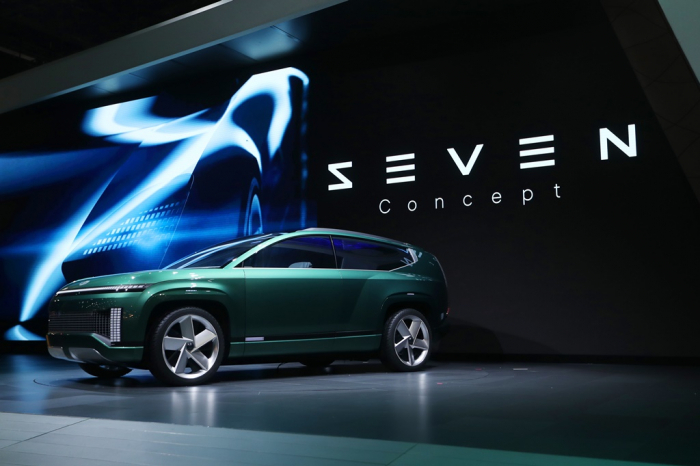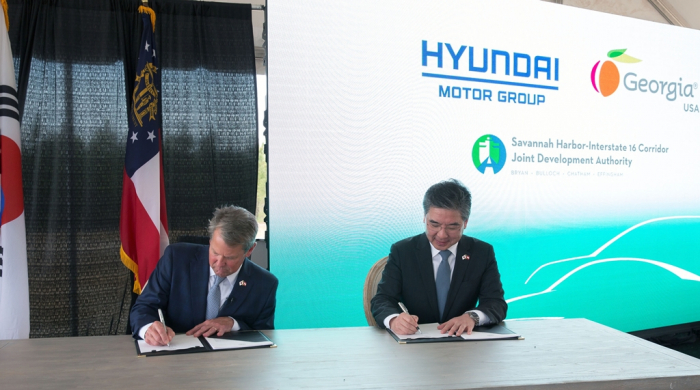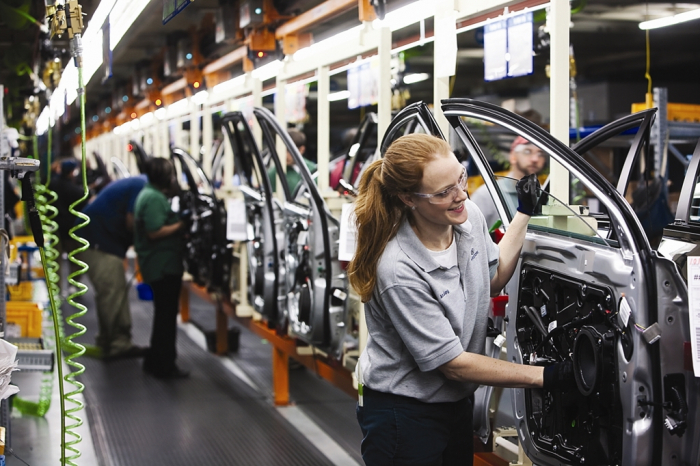Electric vehicles
Hyundai to invest $10.5 bn in US EV, future mobility sectors
S.Korea’s top automaker to spend $5 bn on robotics, UAM, autonomous driving and AI sectors in addition to $5.5 bn on new EV plant
By May 22, 2022 (Gmt+09:00)
5
Min read
Most Read
LG Chem to sell water filter business to Glenwood PE for $692 million


KT&G eyes overseas M&A after rejecting activist fund's offer


Kyobo Life poised to buy Japan’s SBI Group-owned savings bank


StockX in merger talks with Naver’s online reseller Kream


Meritz backs half of ex-manager’s $210 mn hedge fund



Hyundai Motor Group, South Korea’s top automaker, unveiled plans to spend $10.5 billion on the auto industry in the US through 2025 as it aims to expand its future mobility business in the world’s second-largest automobile market.
“Hyundai Motor Group plans to invest an additional $5 billion through 2025 which will strengthen our collaboration with American enterprises in diverse technologies such as robotics, urban air mobility, autonomous driving and artificial intelligence,” Chairman Chung Euisun said in a speech on Sunday after meeting US President Joe Biden in Seoul.
The group on Friday also announced a plan to invest about $5.5 billion to build its first dedicated electric vehicle and battery manufacturing facilities in the US state of Georgia.
“Through these investments, Hyundai Motor Group will provide our valued customers in America with innovative products and solutions, and contribute to global carbon neutrality efforts,” Chung said.
Hyundai's commitment will add wind to the Biden administration’s goal of 40-50% zero-emission vehicle sales in the US by 2030, he added.
Biden welcomed the investment plans.
“Electric vehicles are good for our climate goals, but they’re also good for jobs,” Biden said. “And they’re good for business.”
Biden said Hyundai also plans to invest in EV charging stations in the US.
FIRST DEDICATED EV PLANT IN US
Hyundai Motor Group, the No. 5 automaker in the US, will break ground on the new EV factory in the first half of next year and is expected to begin commercial production in the first half of 2025 with an annual capacity of 300,000 units.
With the plant, the group aims to become one of the top three EV providers in the US by 2026 with goals to lead the market not just in sales, but also in terms of design, technologies, and mobility solutions optimized for the electric mobility era, it said.
“I am confident that this new plant in Georgia will help us become a leader in the American automobile industry by building high-quality electric vehicles for our US customers,” Chung said on Sunday.
Hyundai Motor Co. is likely to manufacture the IONIQ 7, its electric large sport utility vehicle, at the Georgia plant. Its affiliate Kia Corp. may also make strategic EV models there since the factory is responsible for the entire group’s EV production.

The plant will be located in Bryan County, Georgia, about 400 kilometers (250 miles) from Kia Georgia Inc., its US production unit in West Point. The new factory is set to share parts suppliers and logistics systems with Hyundai Motor Manufacturing Alabama, LLC (HMMA), Hyundai’s first US assembly and manufacturing plant.
The group said the battery manufacturing facility on the site will be established through a strategic partnership, although it has yet to provide further details.
South Korea's SK On Co., the world’s fifth-largest battery manufacturer, plans to build a new US factory to supply batteries to Hyundai Motor Group’s dedicated EV plant, The Korea Economic Daily exclusively reported earlier this month.
SK On is set to invest 3 trillion won ($2.4 billion) for its third battery plant in Georgia with an annual capacity of 40 gigawatt hours (GWh).
Hyundai and SK On are reportedly in final talks on a joint investment in the cell factory, according to sources. The battery maker wants Hyundai to spend as much as possible, while the carmaker hopes to take just a minor stake to reserve funds for investment in other businesses, the sources said.
EYEING LEAD IN US EV MARKET
If the planned Georgia factory begins mass production in 2025, it will mark Hyundai Motor Group's first huge step in its US business in 20 years. HMMA began operations in 2005.

The group, once a small domestic carmaker, became a global player with HMMA and Kia Georgia rolling out automobiles.
“Making cars in America was a way for the Hyundai Motor Group to build up global trust,” said a group official.
The planned Georgia plant is expected to help the group expand its share in the world’s third-largest EV market where global automakers are fiercely competing by boosting production capacity.
Ford Motor Co. unveiled a plan to $5.6 billion to build a dedicated EV plant in Tennessee while spending $700 million to convert facilities in Dearborn, Michigan into EV production lines. General Motor Co. is transforming its internal combustion engine plants across the US into EV factories. Volkswagen Group and Toyota Motor Corp. are also considering investments in EV plants in the US.
Hyundai plans to produce 840,000 EVs in the US by 2030, about 26% of its total EV output of 3.2 million.
KOREA EV PARTS MAKERS TO BENEFIT FROM GEORGIA PLANT
Hyundai’s planned EV plant is expected to bolster South Korea’s auto parts makers, especially EV components producers.
Local parts suppliers’ exports have been rising since the group started setting up overseas plants in 2005.
Overseas sales of car components totaled $22.8 billion last year, about quadruple the $6 billion in 2004, according to industry sources on Sunday.
“Hyundai and Kia’s sales volume has a tremendous impact on sales of the domestic auto parts industry,” said one of the sources. “A jump in Hyundai and Kia’s US sales clearly raised parts supplies.”

About 40 South Korean parts makers are currently operating production facilities in the US, supplying components not only to Hyundai and Kia but also to other global automakers.
The planned Georgia factory is expected to force the domestic industry to focus more on EVs, sources said.
The industry is able to produce only 68% of total EV parts, while making 95% for internal combustion engine vehicles, according to the Korea Automotive Technology Institute.
But about 500 parts makers for internal combustion engine cars are expected to disappear by 2030 with 350 and 400 components makers for EVs and hydrogen vehicles predicted to appear, respectively.
“Not all auto parts makers are likely to benefit from new car manufacturing like before,” said Korea Investment & Securities analyst Kim Jin-woo. “Parts makers that focus on the trend of future mobility such as EVs and self-driving cars will be in the spotlight.”
(Updated with Biden's comments, details, analyst comments, background)
Write to Han-Shin Park, Jung-dong Roh and Hyung-Kyu Kim at phs@hankyung.com
Jongwoo Cheon edited this article.
More to Read
-
 BatteriesSK On to build $2.3 bn EV battery plant for Hyundai in US
BatteriesSK On to build $2.3 bn EV battery plant for Hyundai in USMay 12, 2022 (Gmt+09:00)
2 Min read -

-
 AutomobilesHyundai Motor beats Honda in US for the first time in its 35 years there
AutomobilesHyundai Motor beats Honda in US for the first time in its 35 years thereJan 06, 2022 (Gmt+09:00)
3 Min read
Comment 0
LOG IN


